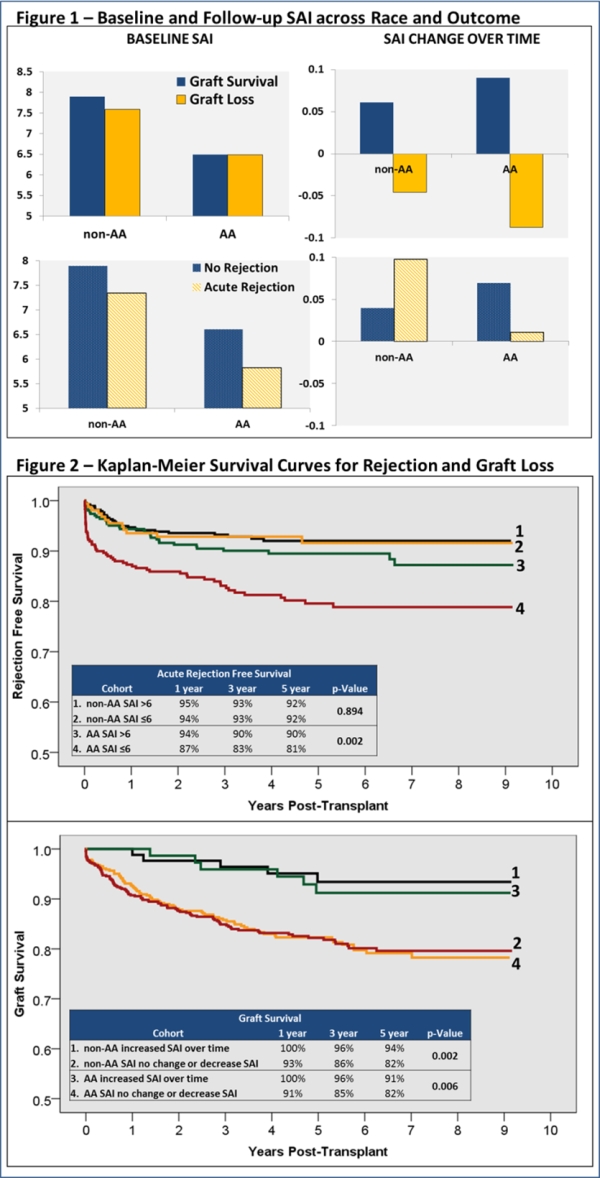A Critical Analysis of the Impact of Socioeconomic Status on Racial Disparities in Kidney Transplantation
Medical University of South Carolina, Charleston, SC.
Meeting: 2015 American Transplant Congress
Abstract number: C28
Keywords: African-American, Graft survival, Outcome, Rejection
Session Information
Session Name: Poster Session C: Disparities in Healthcare Access
Session Type: Poster Session
Date: Monday, May 4, 2015
Session Time: 5:30pm-6:30pm
 Presentation Time: 5:30pm-6:30pm
Presentation Time: 5:30pm-6:30pm
Location: Exhibit Hall E
Socioeconomic status (SES) is a significant determinant of health outcomes and may be an important component of racial disparities in kidney transplantation (KTX). While the social adaptability index (SAI) is a validated quantifiable measure of SES in KTX, it has not been analyzed across race.
Methods: Single–center longitudinal cohort study in adult KTX with the primary aim of determining if the association between SAI scores (both baseline and changing values over time) on clinical outcomes varies by race. We included solitary KTX recipients transplanted between 2005 and 2012. The SAI score included 5 domains (employment, education, marital status, substance abuse and income), each with a min of 0 and max of 3; aggregate range of 0 to 15 (higher score better SES).
Results: 1,171 patients were included, of which 624 (53%) were African-American (AA) and 547 were non-AA. The baseline and change in SAI scores for both acute rejection and graft survival across race are displayed in Figure 1. Baseline SAI of ≤6 was strongly associated with the development of acute rejection in AA patients (5-year rejection rate: AA SAI >6: 10%, AA SAI≤6: 19%, p=0.002), which was not demonstrated in non-AAs (5-year rejection rate: non-AA SAI >6: 8%, non-AA SAI≤6: 8%, p=0.894; top Figure 2). In contrast, a lack of increase in SAI post-transplant was associated with the development of graft loss in both AAs (5-year graft survival: 91% vs. 82%, p=0.006) and non-AAs (5-year graft survival: 94% vs. 82%, p=0.002; bottom Figure 2).
Conclusion: AA patients with low baseline SAI (<6) were at a significantly higher risk of acute rejection, in comparison with non-AAs. A lack of improvement in SES post-transplant is a strong correlate of graft loss for both AA and non-AA patients. These data suggest that SES may represent a component of the causal chain mediating racial disparities in KTX for acute rejection, but fails to account for differences in graft loss.

To cite this abstract in AMA style:
Taber D, Gebregziabher M, Hamedi M, Srinivas T, Chavin K, Baliga P, Egede L. A Critical Analysis of the Impact of Socioeconomic Status on Racial Disparities in Kidney Transplantation [abstract]. Am J Transplant. 2015; 15 (suppl 3). https://atcmeetingabstracts.com/abstract/a-critical-analysis-of-the-impact-of-socioeconomic-status-on-racial-disparities-in-kidney-transplantation/. Accessed February 18, 2026.« Back to 2015 American Transplant Congress
